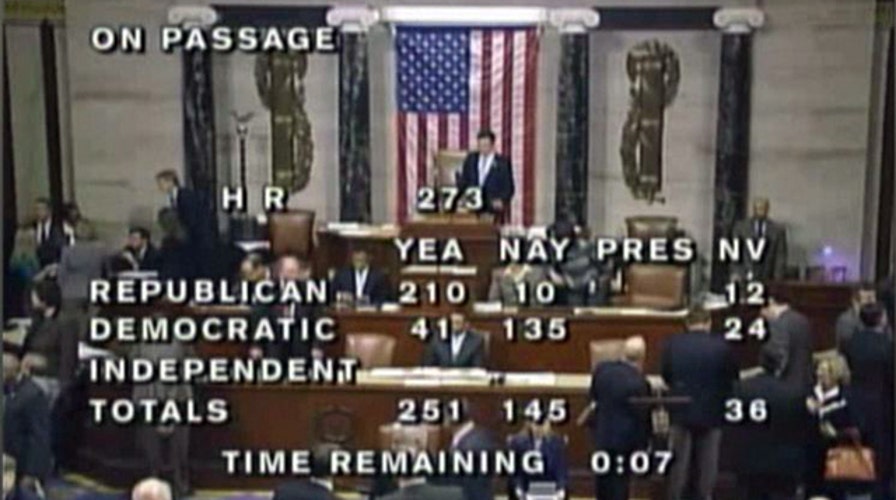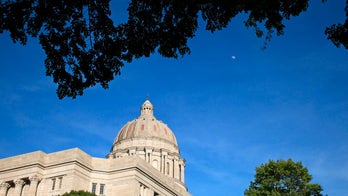The House voted Friday to extend a pay freeze for federal workers, already in effect for more than two years, for another nine months.
Republicans, who largely backed the measure, said it would save $11 billion in the long run and that economically secure public servants could go a little longer without a raise.
Most Democrats, and the White House, criticized the bill as an example of anti-government bias and said Republicans, instead of debating a bill that has little chance of advancing in the Democratic-controlled Senate, should be concentrating on avoiding the pending automatic cuts to federal programs that could have a painful effect on the economy.
The House measure, approved on a 261-154 vote, blocks an executive order issued by President Barack Obama last December that would give the nation's 2 million civilian federal workers a 0.5 percent cost-of-living raise from March 27, when the current federal spending agreement expires, through the end of the year.
The White House has indicated it will also include a 1 percent federal pay increase in its 2014 budget proposal.
The White House, in a statement, opposed the House bill, saying federal workers have already done more than their part in bringing down the deficit and that the legislation was added burden on those who " assure the safety of this country's food and airways, defend the homeland, provide health care to the nation's veterans, search for cures to devastating diseases and provide vital support to our troops at home and abroad."
Obama in 2010 initiated a two-year freeze on federal COLAs as part of an effort to reduce the deficit. Federal worker unions and others opposing the bill say that, with the freeze and higher pension contributions required of new workers, federal employees are already helping save $103 billion over a 10-year period.
But the bill's sponsor, freshman Rep. Ron DeSantis, R-Fla., said his "modest" bill "simply recognizes our current fiscal reality and the fact that government salaries must bear some relationship to the private sector salaries that support them." His bill, estimated at saving $11 billion over 10 years, would also extend the freeze on congressional member pay, now running through September, until the end of the year.
The freeze only applies to cost-of-living adjustments, and not merit and longevity raises. The House Oversight and Government Reform Committee cited figures showing that, with merit-based raises and other "step" increases, the median pay for a federal employee in September last year was $72,714, up more than $3,000 from two years earlier. Committee Chairman Darrell Issa, R-Calif., said the pay freeze would cost each employee $274 for the year.
Those supporting the freeze say the average federal worker compensation, including benefits, is nearly double the median U.S. household income. They point to a 2012 Congressional Budget Office study showing that, while wages are similar for federal workers and comparable private sector workers, federal workers on the whole had more generous benefit packages. Overall, it said, total compensation is 16 percent higher in the public sector.
But federal worker unions rely on Bureau of Labor Statistics surveys showing that in most localities federal employees trail behind private sector counterparts in wages. This is most evident for more highly educated employees who give up lucrative opportunities in the private sector to serve the public.
National Treasury Employees Union president Colleen M. Kelley said the House bill was "a particularly galling step in light of the fact that federal workers have contributed far more than any other group to economic recovery and deficit reduction."
Opponents warned that government workers will also be the first to be hit if Congress fails to find a way to avert $85 billion in automatic spending cuts to occur at the end of this month or come up with a new spending plan when the current law covering federal spending expires at the end of March. "The salary freeze, along with the threat of furloughs, layoffs and another complete government shutdown, are a punishment in search of a crime," said American Federal of Government Employees national president J. David Cox.
One of the harshest critics of the bill was Republican Frank Wolf, whose northern Virginia district includes many federal workers. "This bill is nothing more than a political stunt that targets the hardworking, dedicated men and women of the civil service," he said in a letter to his GOP colleagues, reminding them that people who haven't seen a raise in more than two years include CIA and FBI agents, border and customs agents, nurses and doctors at VA facilities, food inspectors, firefighters at national forests and NASA astronauts and engineers.
According to the Office of Personnel Management, there were about 2.1 million civilian workers in 2011. The number has been consistently around the 2 million mark for the past 50 years.





